- Home
- A. C. Crispin
Alien Resurrection
Alien Resurrection Read online
Contents
Cover
Also Available from Titan Books
Title Page
Copyright
Prologue
1
2
3
4
5
6
7
8
9
10
11
12
13
14
15
Epilogue
About the Author
Available Now from Titan Books
ALSO AVAILABLE FROM TITAN BOOKS
ALIEN™: OUT OF THE SHADOWS
ALIEN: SEA OF SORROWS
ALIEN: RIVER OF PAIN
THE OFFICIAL MOVIE NO VELIZATIONS
ALIEN
ALIENS™
ALIEN3
Alien™: Resurrection: The Official Movie Novelization
Print edition ISBN: 9781783296736
E-book edition ISBN: 9781783296743
Published by Titan Books
A division of Titan Publishing Group Ltd
144 Southwark Street, London SE1 0UP
First edition: March 2015
2 4 6 8 10 9 7 5 3 1
This is a work of fiction. Names, characters, places, and incidents either are the product of the author’s imagination or are used fictitiously, and any resemblance to actual persons, living or dead, business establishments, events, or locales is entirely coincidental. The publisher does not have any control over and does not assume any responsibility for author or third-party websites or their content.
™ & © 1997, 2015 Twentieth Century Fox Film Corporation.
All rights reserved.
No part of this publication may be reproduced, stored in a retrieval system, or transmitted, in any form or by any means without the prior written permission of the publisher, nor be otherwise circulated in any form of binding or cover other than that in which it is published and without a similar condition being imposed on the subsequent purchaser.
A CIP catalogue record for this title is available from the British Library.
Did you enjoy this book?
We love to hear from our readers. Please email us at [email protected] or write to us at Reader Feedback at the above address.
To receive advance information, news, competitions, and exclusive offers online, please sign up for the Titan newsletter on our website
www.titanbooks.com
PROLOGUE
“That’s an alien!”
Vincent Distephano jerked back involuntarily at the realization. How the hell did it get down here in the aft command capsule? He made himself stop moving as he stared in surprise at the creature’s grotesque appearance.
The alien’s eyes seemed huge, totally disproportionate to the rest of its elongated, misshapen head. The narrow, elliptical iris appeared to curve around the lens, marking it as something other-worldly, non-Terran. It blinked, its translucent lids moving so rapidly, Vinnie couldn’t say if the blink started at the top, the bottom, or even from the sides. In fact, the lids, when not in motion, could not be seen at all. It blinked again, rapidly, two, three times, then turned its head.
Was it aware of him?
Oh, shit!
The creature’s jaws opened threateningly, thin ropes of clear, thick drool forming between thin lips, dripping slowly down dangerously pointed teeth. So many teeth! The lips drew back in a fierce, but silent snarl and the creature moved forward slowly.
Vinnie forced himself to remain motionless as the thing’s maw opened and closed slowly, dripping strands of thick, sticky saliva.
If one of those things got down here, he thought, there could be more of them. Maybe a whole damned swarm! Where’d they come from anyway? How’d they get aboard?
Did it matter? This one was here, right now, with him, and that was the bottom line. The alien scuttled forward and stopped, its movement rapid, insectile, its tail bobbing like a sensor. Could it see him? Was it even aware of him here in the command capsule? Were the huge eyes functional, or had they evolved to detect food or prey by some light-source or sensation undetectable to humans? Could it, perhaps, be more sensitive to motion or scent than vision?
The alien’s grotesque, elongated head swiveled as though the creature were trying to evaluate the entire scene. The many blinking lights and active, multi-colored screens of the command console must be distracting it. Maybe all the command console activity would keep it from discovering Vinnie. He sincerely hoped so. He swallowed.
Just then, one of the observation screens flickered, changing images so rapidly that the alien pivoted to face it. The planet Pluto, sitting silently beneath the ship, was suddenly featured in a startling close-up as one of its few small geysers erupted, spewing liquid nitrogen into space. The brightness of Pluto’s frost bands, even with the random dark reddish areas, was a shocking contrast with the total blackness of the space around it. The creature moved its head from side to side, observing the planetary activity. The geyser activity crested, the silent spewing reaching its zenith. The screen brought the activity into clearer focus, zooming in. In response, the alien turned completely away from Vinnie and suddenly darted toward the screen, as mobile as a spider.
Now! Quick! While it isn’t looking! Move it! With the sharp reflexes of the trained soldier he was, Vinnie’s hand darted out, his trigger finger extending, flexing—
WHAM!
Gotcha, sucker!
He lifted his hand, examining the crushed remains of the dead alien insect stuck to the end of his finger. Wonder what the hell it was? He shook his head in disgust. General Perez would have a shit fit if he heard that there was an alien bug aboard the pristine perfection of his vessel, the Auriga, never mind right in the command capsule. Was this one the only one, or were there others? It only took two to make a thousand. Hell, with some alien species, it only took one.
Still examining the squashed bug, the young soldier took a last slurp from his milk shake, swallowing the dregs. He’d have just as big a shit fit about your eating on duty, boy. Vinnie smiled. Yeah, General Perez was strictly by-the-book, but Vinnie had missed breakfast and he wouldn’t make it to lunch without something to tide him over. Sitting in the command capsule was about the most boring thing to do on the enormous ship. The only thing worse would be to be stuck here with a growling stomach.
He crushed the flimsy cup and stowed it in a pocket, then took the straw from his drink and poked at the remnants of the bug with it. He could still see the elongated head, the tiny, but vicious teeth.
Ugh! You are one ugly mutha. So, how did you crawl on board? You must be from one of the general’s “unofficial” cargo deliveries from some obscure colony beyond the fringes of the frontier. Not that I would know, or would wanna know! When you were a soldier working on a top-secret installation drifting around the gravitational center of Pluto and Charon—in other words, the middle of bum-fuck nowhere!— you learned not to ask, not to tell anything.
The only thing Vinnie had learned in his seemingly endless one-year tour of duty aboard the Auriga was that an assignment to a top-secret installation had to be the most boring job any soldier could be cursed with. Nothing ever happened here, nothing! And General Perez made sure of it, with his constant inspections, his spit-and-polish routine. Every piece of equipment, every computer chip, every installation aboard the Auriga was top of the line, new, shiny, polished, and maintained to perfection. There weren’t even any mechanical crises to relieve the boredom.
Well, in three months, Vinnie would be out of here. And having successfully completed a top-secret tour, he’d have his pick of assignments.
Better believe my next one will have more action than this did. Maybe the o
utpost on Rigel. Shit happens there. It’s cutting edge. Not like this spook-fest.
He inspected the insect again, picking the pieces apart with his straw. The Auriga’s losing war with bugs was at least humorous in a ludicrous way. Vinnie wasn’t used to seeing insects in space. Of course, the military was notorious for transporting vermin anywhere it traveled, from rats and fleas in cargo and food stores aboard ancient wooden ships, to the introduction of the brown tree snake around the South Pacific Islands in cargo, food, and weaponry crates that caused the extinction of entire bird species in the twentieth century, to a nearly debilitating infestation of common cockroaches from supposedly sterilized, vacuum-sealed dehydrated food delivered to the first Mars colony in the early days of space colonization. But the conditions of most cargo holds usually eliminated the little bastards, so these days the problem was minimized.
Except for the Auriga. Between the mosquitoes that had escaped from some early lab experiment and kept popping up in the strangest places, to the spiders that had appeared suddenly after one of Perez’s unofficial cargo drops, to the occasional alien bug like the one he’d just squashed, the huge spaceship seemed like a giant bug collector! It was as if the galaxy’s lowest life-forms had made it their business to show General Perez that no matter how important he was to the military, no matter how critical his hush-hush operations were out here on the edge of the solar system, he still couldn’t control Mother Nature. Vinnie smiled.
Scraping the remnants of the bug, still dripping blood and drool, into the plastic straw, Vinnie considered reporting the “sighting.” That was the general’s rule. It drove the Old Man crazy to have any uninvited guests aboard his pristine vessel. He always wanted the bugs caught, alive if possible, for “classification” so they could track down its origins. Vinnie thought about the paperwork involved, the investigation, thought about all that ridiculous hassle over a bug. He looked at the end of the straw.
Screw that!
Pointing the straw toward the immaculate viewport of the command capsule, he blew hard into it, ejecting the crushed insect. It impacted against the clear port, splattering, sticking to the transparent material just like a bug on the windshield of a land speeder. Vinnie laughed.
And that, son, is the high point of this interminable shift!
He glanced over the command console and the multiple screens. Everything was quiet. Calm. Boring as death. Even the geyser had stopped erupting. The soldier sighed, scratched his nearly shaven head, and tried not to watch the clock counting down the seconds left in his shift.
Maybe another bug would show up to distract him. He could always look forward to that.
1
Dr. Mason Wren moved briskly along the neutral-colored corridors toward his main lab. General Perez had summoned him for an unexpected briefing while he was in the middle of breakfast, and the twenty-three minutes he’d lost in that meeting were now playing havoc with the scientist’s schedule. Fortunately, Wren could rely on his staff to be on time, to start all the morning programs, check all the results of the night shift’s work, and be ready to apprise him of the experiment’s current status. He strode along, checking his lapel pager out of habit. No messages. Father—or rather, the artificial male voice of the massive state-of-the-art computer system that maintained life-support, research functions, and all other critical systems of the gigantic Auriga—would tell him if there were any messages.
No news is good news.
When Perez had first called him, he’d anticipated trouble, some problem in the new construct, but no. It’d just been some work details the Old Man wanted him to be aware of, so he could be sure his chief scientist was up to date. It’d been two weeks without any middle-of-the-night summons to the lab, and Wren had been gratified at the sudden burst of progress they’d been making. Maybe, at last, they’d finally turned the corner.
The slender, balding scientist approached the lab doors at his usual quick clip, barely noticing the two fully armed soldiers standing guard. They were invisible to him, part of the scenery, like furniture or the rivets on the pneumatic doors. He was aware on some level that the soldiers themselves changed every four hours, but to Wren they all looked identical—square-jawed, eyes locked ahead, olive-drab body armor, massive weaponry held at ready, ever on alert. Black, white, brown, male, female—they all looked the same to Wren. They were soldiers. Grunts. Joes.
He and his staff were doctors. They were scientists. From the least experienced tech to himself, his staff served a higher purpose; the expansion of knowledge, the advancement of humanity, the improvement of the human condition. The soldiers had one purpose to Wren, to make sure he and his staff could accomplish their goals. They were all—both soldiers and scientists—military, but the demarcation of value was clear, in Wren’s mind.
As he continued his approach, the doors opened soundlessly, admitting him to the main lab. As he passed the two guards, he noted distantly, with some amusement, that not only did they look identical, they even chewed their gum in the same rhythm. Like robots. No, not like robots. Robots had actually been pretty individualistic… when they’d still existed.
Behind him, the doors closed as soundlessly as they’d opened, and now the soldiers were forgotten. As he’d expected, his staff was all here, everyone fully engaged, doing their jobs, the work of science. And this lab was the perfect place to do that job. Every piece of equipment, every program, every person in here was the best. And their results would prove their value.
Wren came up on the first workstation, glancing at the myriad screens there. He noted the rapidly shifting data patterns, recording in his mind the progress they indicated. He looked sideways at Dr. Carlyn Williamson, and she gave him a small smile.
“We’re still on the money, Dr. Wren,” she told him, pleased.
He smiled back. “Nice way to start the morning, Carlyn.”
He moved to the next station, nodding at Drs. Matt Kinloch, Yoshi Watanabe, Brian Clauss, Dan Sprague, and their graduate student, Trish Fontaine. Kinloch gave him a thumbs-up, which Wren knew was a positive reference to a battery of tests they’d begun last night. Wren returned the gesture and kept moving. One part of his mind noted the similarity of garb of himself and his staff—scrubs or military drabs covered by identical ubiquitous lab coats—and wondered if Perez had as much trouble telling his people apart as Wren did the general’s soldiers.
After he’d toured the area once, and been satisfied that everything was exactly the way he wanted it—a situation that seemed almost too good to be true—Dr. Wren finally allowed himself to approach the incubator.
Dr. Jonathan Gediman, his young, dark-haired, eager associate, was waiting for him, his body so tense with anticipation, Wren half expected him to start dancing from foot to foot. Wren really couldn’t blame his protégé. Everything he’d seen this morning told him things were still progressing beautifully. But after all the failures they’d endured so far, Wren wanted to postpone any sense of satisfaction. There was still plenty that could go wrong.
“You waited for me,” Wren said to his associate. “I appreciate that.”
Gediman nodded. “I had enough to keep me busy. Are you ready to view her now?”
Wren repressed a frown. He didn’t like the tendency Gediman had to personalize the specimen. It didn’t seem professional. But Gediman was such a good worker, so committed to the experiment, and so creative, that Wren tried to overlook such foibles.
“Sure,” Wren told Gediman, “let’s look at the specimen.”
Gediman tapped the controls in the proper sequence, and they both watched data stream across the small screen at the top of the incubator. The tall metal cylinder adjusted its own temperature, as cold vapors wafted off the exterior. Slowly, mechanically, the external metal housing rotated, then rose, moving up until it touched the ceiling, where it halted. The metal housing opened automatically, revealing a smallish cryogenic tube about a meter long and a half meter in diameter.
Wren stared up at the
data. The length and progress of incubation, components of the chemical growing medium, electrical stimulation of cells, and so on, moved across the screen in a constantly updated pattern.
“There she is!” Gediman’s voice murmured softly.
His tone made Wren glance at him. Gediman’s eyes were wide, his expression as hopeful as a father seeing his newborn infant for the first time. It pleased Wren. In many ways, this was Gediman’s offspring. Gediman, Wren, Kinloch, Clauss, Williamson—every person in this lab was the specimen’s parent, and Wren encouraged them to feel proprietary about it. That kind of possessive pride encouraged greater effort, more creative thinking, a devotion to the cause that no salary could compensate for. Wren had to smile.
“Look at her face!” Gediman said with that same proud awe.
Wren looked, as the specimen floated into view through the opaque gel that surrounded it, nurtured it, urged it to develop. At first, the specimen seemed little more than a vague mass. Curled in a classic fetal position—and that alone marks a miracle of scientific achievement—it floated closer to the glass, allowing Wren to see what Gediman had noted.
It was the face of a child, a lovely human girl, and Wren found himself swept up in the same excitement that had captured Gediman. The features had developed to the point where they were recognizable, not just as human, but as an individual. Tiny wisps of baby-fine brown hair floated around the perfectly shaped head, giving the specimen an ethereal appearance, like some kind of mer-child. Wren blinked, pulling his mind out of fantasy. His trained eye examined the various tubes, cables, and readout sensors attached to the tiny specimen. Everything was right where it was supposed to be, doing its job, feeding the specimen, nurturing it, stimulating it to grow and develop far faster than nature ever intended.
But then Wren had no patience for nature—not for its slowness, not for its errors, and certainly not for its random surprises. He was not the least bit interested in nature’s surprises. His job was to anticipate nature and mold it to his needs. It was beginning to look as if he’d finally done that. He smiled, his fingers grazing the incubator’s sides almost caressingly.

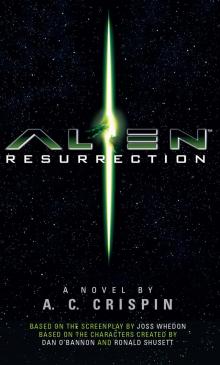 Alien Resurrection
Alien Resurrection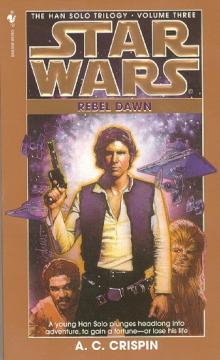 Star Wars - The Han Solo Trilogy - Rebel Dawn
Star Wars - The Han Solo Trilogy - Rebel Dawn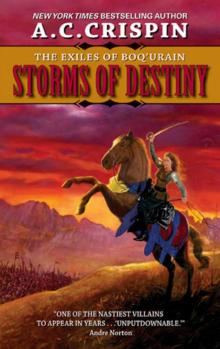 Storms of Destiny
Storms of Destiny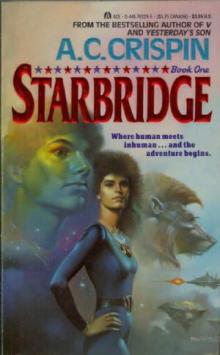 Starbridge
Starbridge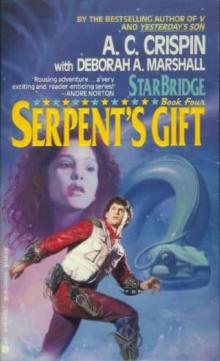 Serpent's Gift
Serpent's Gift Pirates of the Caribbean: The Price of Freedom
Pirates of the Caribbean: The Price of Freedom V01 - V
V01 - V Silent Dances
Silent Dances V
V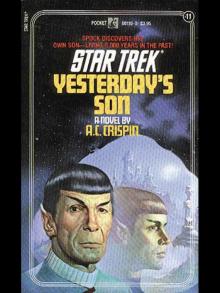 Yesterday's Son
Yesterday's Son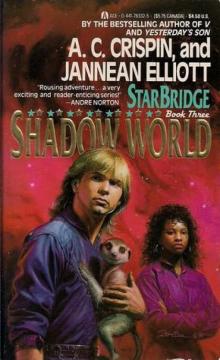 Shadow World
Shadow World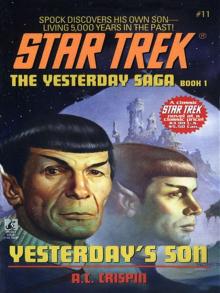 STAR TREK: TOS #11 - The Yesterday Saga I - Yesterday's Son
STAR TREK: TOS #11 - The Yesterday Saga I - Yesterday's Son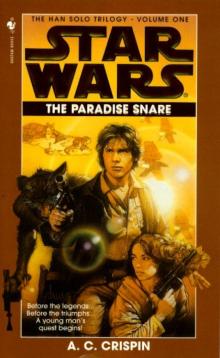 Star Wars - Han Solo Trilogy - The Paradise Snare
Star Wars - Han Solo Trilogy - The Paradise Snare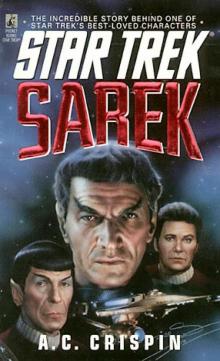 Star Trek - Sarek
Star Trek - Sarek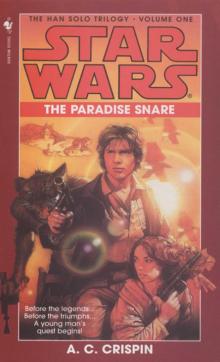 Star Wars: The Han Solo Trilogy I: The Paradise Snare
Star Wars: The Han Solo Trilogy I: The Paradise Snare